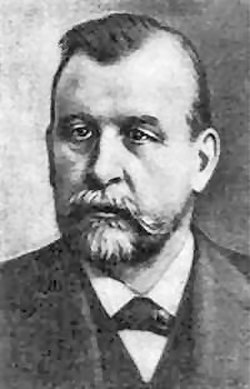Nikolai Menshutkin
| Nikolai Aleksandrovich Menshutkin | |
|---|---|
 |
|
| Born |
October 24, 1842 Saint Petersburg, Russian Empire |
| Died | February 5, 1907 (aged 64) St. Petersburg, Russian Empire |
| Nationality | Russian |
| Fields | Chemistry |
| Institutions | University of St. Petersburg |
| Known for | Discovery of the Menshutkin reaction |
Nikolai Aleksandrovich Menshutkin (Russian: Николáй Алексáндрович Меншýткин; 24 October [O.S. 12 October] 1842 – 5 February [O.S. 22 January] 1907) was a Russian chemist who discovered the process of converting a tertiary amine to a quaternary ammonium salt via the reaction with an alkyl halide, now known as the Menshutkin reaction.
Menshutkin was born in a merchant family as the sixth son of Alexander Nikolaevitch Menshutkin. He graduated with honors from gymnasium in December 1857, but only by autumn 1858 managed to enroll to the Saint Petersburg State University, as he was still under the prescribed age of 16. He studied at the faculty of physics and mathematics and was nearly expelled in the autumn of 1861 due to some political disturbances. Nevertheless, by the spring of 1862 he attained the master's degree. During the last years he became interested in chemistry, which he studied under Dmitri Mendeleev. While he acquired a sufficient knowledge of theory he was lacking practice, as at that time the entire laboratory of the university consisted of only two small rooms. Therefore, he went abroad, and in the following three years spent two semesters with Adolph Strecker at the University of Tübingen, a year (1864–5) with Charles-Adolphe Wurtz at the University of Paris, and a semester with Adolph Wilhelm Hermann Kolbe at the University of Marburg.
In the meantime, many changes were introduced into the constitution of the Russian universities. In 1863 the universities obtained academic freedom, they chose for themselves the professors, deans, and rectors, at the same time the means of teaching improved, and, owing to Mendeleev’s efforts, the laboratory at St. Petersburg University was enlarged. In 1865 Menshutkin returned to St. Petersburg, just after his PhD thesis was published in the Comptes Rendus of the French Academy under the title “Action du chlorure d’acetyle sur l’acide phosphoreux”. He defended it in March 1866 against Aleksandr Butlerov and Dmitri Mendeleev and in autumn began teaching a course on organic nitrogen compounds. On 6 April 1869, he defended his habilitation on “The Synthesis and Properties of the Ureides” and shortly was appointed as professor of analytical chemistry. In connection with his teaching he proceeded to rearrange the course of instructions and in 1871 brought out his well-known textbook, which survived 16 editions up to 1931 and had been translated into German and English. In 1871, Menshutkin became secretary of the faculty of physics and mathematics and in 1879 was appointed as dean, an office which he held until 1887.
...
Wikipedia
